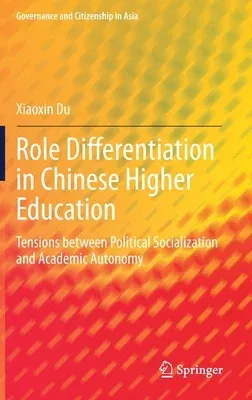Xiaoxin Du
(Author)Role Differentiation in Chinese Higher Education: Tensions Between Political Socialization and Academic Autonomy (2020)Hardcover - 2020, 1 December 2020

Qty
1
Turbo
Ships in 2 - 3 days
In Stock
Free Delivery
Cash on Delivery
15 Days
Free Returns
Secure Checkout

Part of Series
Governance and Citizenship in Asia
Print Length
178 pages
Language
English
Publisher
Springer
Date Published
1 Dec 2020
ISBN-10
9811582998
ISBN-13
9789811582998
Description
Product Details
Author:
Book Edition:
2020
Book Format:
Hardcover
Country of Origin:
NL
Date Published:
1 December 2020
Dimensions:
23.39 x
15.6 x
1.27 cm
ISBN-10:
9811582998
ISBN-13:
9789811582998
Language:
English
Location:
Singapore
Pages:
178
Publisher:
Weight:
453.59 gm